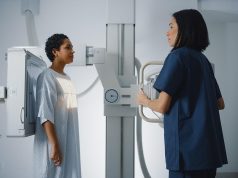Sensitivity increased for subgroups with small lesion sizes, invasive carcinomas
MONDAY, Sept. 12, 2022 (HealthDay News) — A decision-referral approach could leverage the strengths of both the radiologist and artificial intelligence to improve the diagnostic capability for breast cancer screening, according to a study published in the July issue of The Lancet Digital Health.
Christian Leibig, Ph.D., from University-Hospital Essen in Germany, and colleagues evaluated the performance of an AI system on sensitivity and specificity when used either as a standalone system or within a decision-referral approach in comparison to the original radiologist decision. The analysis included almost 1.2 million full-field, digital mammography studies from eight screening sites.
The researchers found that the configuration of the AI system in standalone mode achieved a sensitivity of 84.2 percent and a specificity of 89.5 percent on internal-test data and a sensitivity of 84.6 percent and a specificity of 91.3 percent on external-test data. However, it was less accurate than the average unaided radiologist. The simulated decision-referral approach significantly improved upon radiologist sensitivity and specificity by 2.6 and 1.0 percentage points, respectively, corresponding to a triaging performance at 63.0 percent on the external dataset. The area under the receiver operating characteristic curve was 0.982 on the subset of studies assessed by AI, surpassing radiologist performance. There were significant increases observed in sensitivity using the decision-referral approach for a number of clinically relevant subgroups, including subgroups of small lesion sizes and invasive carcinomas.
“The results of this study could improve the safe rollout of AI algorithms, leading to enhanced efficacy parameters in nationwide screening programs and reduced workloads for radiologists,” the authors write.
The study was funded by Vara.
Copyright © 2022 HealthDay. All rights reserved.








